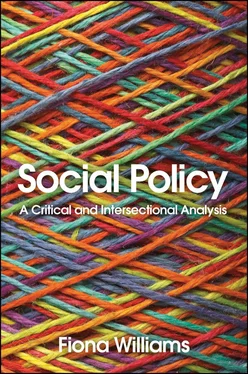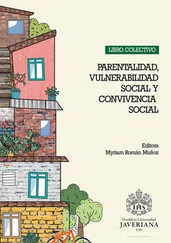Chapter 3synthesizes this combination of intersectionality and critical social policy approaches into a framework for analysing contemporary welfare states. I argue that those analyses of recent developments in neo-liberal and austerity welfare as emerging from the 2008 financial crisis of capitalism are not able to explain the particular forms of gender, race, class and disability-related inequalities that are its consequence. Building on but critiquing Fraser’s feminist reinterpretation of Polanyi’s analysis of the history of capitalist crisis, I propose that we should contextualize austerity welfare in terms of four intersecting crises, all of which threaten human and planetary sustainability: the financialized crisis of capitalism; the crisis of care and social reproduction; the crisis of the environment and climate change; and the crisis of the external and internal racializing of national borders. Within this frame I develop a second framing for analysis of social policies at the national level. This articulates the key organizing principles of contemporary welfare states as family, nation, work and nature. It is the social relations, changes and contestations in these four domains that unsettle welfare governance, but at the same time these domains are among the principal vectors through which governments seek to legitimize their attempts to resettle and restructure welfare.
The second part of the book, on Analysis, contains three chapters. In chapter 4I apply the family–nation–work–nature analysis to the decade which starts in 2010 with austerity and ends in 2020 with the Covid-19 pandemic. (The pandemic struck as I was over half-way through the book, so references to it are largely time limited to the late summer of 2020.) The analysis focuses on three clusters of social policies during the era, each of which mutually connects one of the four domains of family, nation, work and nature to one of the others. Thus, the first section draws out the intersecting inequalities that are linked by ‘hard work’ and aspects of family, care and intimacy – the depletion and devaluation of care, the responsibilization of parenting with the attribution of blame, the intersectional effects of austerity on BAME women, and, in contrast, the recognition of relationship diversity. The second focus is on bordering practices in a post-racial context. ‘Post-racial’ refers to the perspective which regards the issue of race, anti-racism and multiculturalism as a thing of the past, something that is settled. As Goldberg (2015: 34) defines it: ‘The post-racial is the racial condition in denial of the structural.’ I show how this perspective reinforced assimilation and integration in ways which were Islamophobic while, at the same time, instituting bordering practices that increasingly set minority groups in the population apart and subject to surveillance and to restrictions in their social and civil rights. This includes the well-known case of the Windrush betrayal. The term ‘bordering’ refers back to external bordering practices against migrants and asylum seekers (discussed in chapter 3) which became the template for the governance of other social groups. This attempt to settle a ‘post-racial’ common sense signals the creep of necropolitics through ‘nation’ and ‘nature’, which is discussed in the third section through three different events: the Grenfell Tower fire; the politics of welfare ethno-nationalism in the Brexit debate; and, last, the Covid-19 pandemic. I show how all three clusters of policy were constituted through a style of governance that was incompetent and indifferent. Its method of gaining public consent for policies was depriving and dehumanizing in two ways: first, a shape-shifting of liberal values of fairness, equality and tolerance which gave rise to quite the opposite outcomes; and, second, the exercise of the classic underserving/deserving divide. As the decade wore on, this binary became more dependent on ethno-nationalist populism. The pandemic was to expose many of the inequalities and incompetencies that marked the decade.
Where chapter 4explores the constitution of people as welfare subjects, chapter 5turns to agency, activism and the nuances of contestation. It looks at how the ‘turn to agency’ from the 1990s in the discipline of social policy was one of its most important critical developments. This chapter explains what prompted the turn and its key shift into understanding agency as relational. It offers an intersectional approach to agency that works in two ways – in understanding the interconnected, shifting and multifaceted nature of power in the exercise of agency and in making visible those spaces of resistance that often remain out of sight. It also focuses on the ‘double helix’ of agency – that is, where one spiral relates to multiple social relations of gender, class, race, etc., and an interconnecting spiral signifies the relationship between welfare providers and users. This chapter is the book’s pivot: it provides an understanding of how resistance and contestation is carried through everyday actions and quiet solidarities of mutual care and support; it explains how this happened during the decade of austerity in spite of earlier ideas that feminism and anti-racism had had their day; and it links to the prefigurative politics explored in chapter 7.
In chapter 6I turn back to one of the four crises in chapter 3– care and social reproduction and its links to transnational mobility – to examine the phenomenon of migrant care workers who move to care for the families and households in richer countries, often leaving their own children behind to be looked after by others. The chapter develops an analysis of the imbricating scales of global, national and interpersonal that migrant care workers inhabit. At the global level are both the care market and the possibilities for reform and advocacy through international organizations and transnational migrant support groups. At the national scale migrant care work is shaped by the ways care practices and policies intersect with employment policies which devalue care work and rules and regulations around migration which deem care work unskilled. At the interpersonal scale are a complex of social relations between the migrant care worker and the person for whom she cares or works. At all scales, this is about the intersections of inequalities of gender, race, class, migration status and nationality, underpinned by geo-political inequalities between richer and poorer nations, historically constituted in colonial relations of racialized servitude. This raises challenging questions for the meaning of global social justice. I argue that there are a number of immediate strategies that would improve the position of migrant care workers, but, in the long term, the complex relations of inequality it embodies require, for a start, that the everyday relations of paid and unpaid work are not subsumed under the goals of economic growth but become central to global social justice and strategies for sustainability.
The third and final part of the book explores praxis. Chapter 7brings many of the themes of the book together. Recalling the point made earlier that some of the most significant struggles today are around the provision of care and support, around climate change and around the dehumanization of racialized groups and migrants, I explore three sets of political ethics – by political, I mean ethics that are not abstracted but grounded in struggles for emancipation. I examine the ethics of care, environmental ethics and decolonial ethics. While there are differences across and within these ethical positions, they share a critique of Western-centric liberal notions of rational white male, able-bodied, heterosexual autonomy. They also challenge neoliberal values of individualism, autonomy and competition and the dependence of capitalism upon economic growth. Instead they promote interdependence, reciprocity, human flourishing and sustainability. Together they expand the notion of interdependence to include moral obligations not only to distant strangers across the world but also to the planet and its non-human and living organisms, to future generations’ right to inherit a sustainable planet, and to those past generations who suffered slavery and other forms of dehumanization from colonialism and imperialism. They point to new models for the economy, for deliberative democracy and for the recognition of different forms of knowledge that incorporate a new pluriversal humanism. I combine these guiding principles with the resurgence of prefigurative politics of civil society actors and their attempts to develop in new ways the principles of multiple interdependencies, relationality, democratic deliberation and interpersonal, local and translocal solidarities. With these in mind, I explore commonalities and tensions in different proposals for a social commons and a changed relationship between people and the state, emphasizing the urgency of the need to reimagine the welfare state.
Читать дальше












